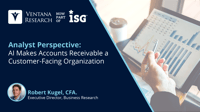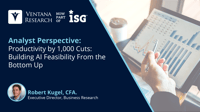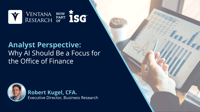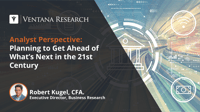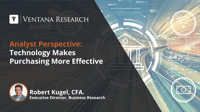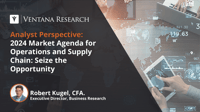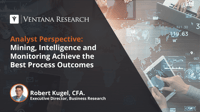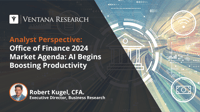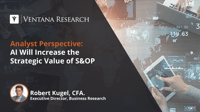Artificial intelligence seems poised to change everything, although naturally a great deal of attention tends to be paid to the cool things it makes possible. AI can also make the humdrum less tedious and even transform the dullest of back-office operations into something more meaningful. For example, AI can take accounts receivable automation to the next level.
Read More
Topics:
Office of Finance,
AI,
digital finance,
AI and Machine Learning,
Order-to-Cash
Zoho recently held its annual analyst day to communicate its strategy, objectives and product roadmap. The privately held company, headquartered in Chennai, Tamil Nadu, India, has an unconventional approach to the software market. Its self-described corporate philosophy emphasizes making bold moves that challenge assumptions. Its design engineering approach stresses simplicity and cost while aiming to provide easy-to-use software with sufficient capabilities to improve personal and...
Read More
Topics:
Office of Finance,
Voice of the Customer,
Digital Commerce,
ERP and Continuous Accounting,
digital finance,
Customer Experience Management,
Generative AI,
Procure-to-Pay,
Order-to-Cash
After a year of near-constant AI chatter, the broad strokes of how the technology will roll out in business over the next three to five years are coming into place. It’s almost trite but worth repeating that artificial intelligence will drive a substantial boost in productivity as it’s adopted. Rather than making large swathes of jobs obsolete, it will take the robotic work out of those job descriptions, enabling people to focus on tasks with a greater economic return.
Read More
Topics:
Office of Finance,
Business Planning,
ERP and Continuous Accounting,
AI,
digital finance,
Generative AI,
Procure-to-Pay,
Order-to-Cash,
Consolidate and Close Management
With a year of AI-everywhere-all-the-time chatter now in the rearview mirror, finance and accounting department executives appear to be in a state of apprehension and well-tuned skepticism about the impact this technology will have on their organization. There are solid reasons to believe that the next few years will be transformative, making it important for departments to adopt a fast-follower approach to artificial intelligence. Rather than being a laggard, leaders must be ready to take...
Read More
Topics:
Office of Finance,
Business Planning,
ERP and Continuous Accounting,
digital finance,
Procure-to-Pay,
Order-to-Cash,
Consolidate and Close Management
We live in an era of uncertainty, not unpredictability. Managing in uncertain times is always difficult, but tools are available to improve the odds for success by making it easier and faster to plan for contingencies and scenarios. Software makes it possible to manage ahead of any future event, connecting the tactical trees to the strategic forest. The purpose of planning is not just to create a plan: Enterprises spend time thinking ahead because it enables leadership teams, executives and...
Read More
Topics:
Office of Finance,
Continuous Planning,
Data Management,
Business Planning,
data operations,
digital finance,
AI and Machine Learning
Digitally transforming finance operations has been a priority since 2020. For purchasing and the procure-to-pay cycle, software can streamline processes, shorten process times, reduce unnecessary costs, provide greater visibility into cash flows, increase control and improve results. Digitizing operations helps attract and retain the best talent because professionals spend less time on mechanical, repetitive tasks. For all these reasons, beginning this year, Ventana Research’s Office of Finance...
Read More
Topics:
Office of Finance,
Continuous Planning,
Business Planning,
digital finance,
supplier relationship management,
Continuous Supply Chain & ERP,
Generative AI,
Procure-to-Pay
Ventana Research recently announced its 2024 market agenda for Operations and Supply Chain, continuing the guidance we have offered for more than two decades to help enterprises across industries derive optimal value and improved outcomes from business technology.
Read More
Topics:
Continuous Planning,
Product Information Management,
Operations & Supply Chain,
Sustainability Management,
supplier relationship management,
Property Technology,
Continuous Supply Chain & ERP
Since a majority of today’s workforce wasn’t around in the 1990s, it’s worth noting that “business process reengineering” was all the rage. The purpose was to review, restructure and redesign core business processes to achieve substantial improvements in market and customer responsiveness, productivity, cycle times and quality. One reason for its popularity (beyond being a money spinner for consultants) was the promised ability for the newly available enterprise resource planning systems to be...
Read More
Topics:
Operations & Supply Chain,
Enterprise Resource Planning,
ERP and Continuous Accounting,
digital finance,
Purchasing/Sourcing/Payments,
Continuous Supply Chain & ERP
Ventana Research recently announced its 2024 Market Agenda for the Office of Finance, continuing the guidance we have provided since 2004 on the practical use of technology for the finance and accounting department. Our insights and best practices aim to enable enterprises to operate with agility and resiliency, improving performance and delivering greater value as a strategic partner.
Read More
Topics:
Office of Finance,
Business Planning,
ERP and Continuous Accounting,
digital finance,
Consolidate/Close/Report
Sales and operations planning (S&OP) is trending toward becoming more strategic in product-centric companies through the end of the decade. The purpose of S&OP has grown in importance. Since the mid-teens, the trade and economic environment has become less benign and more unpredictable, forcing many enterprises to redesign their supply chains for resiliency while still surmounting the dual challenges of remaining cost competitive and achieving financial targets. Over the past decade, there have...
Read More
Topics:
Continuous Planning,
Operations & Supply Chain,
Enterprise Resource Planning,
digital finance,
Sustainability Management,
AI and Machine Learning
